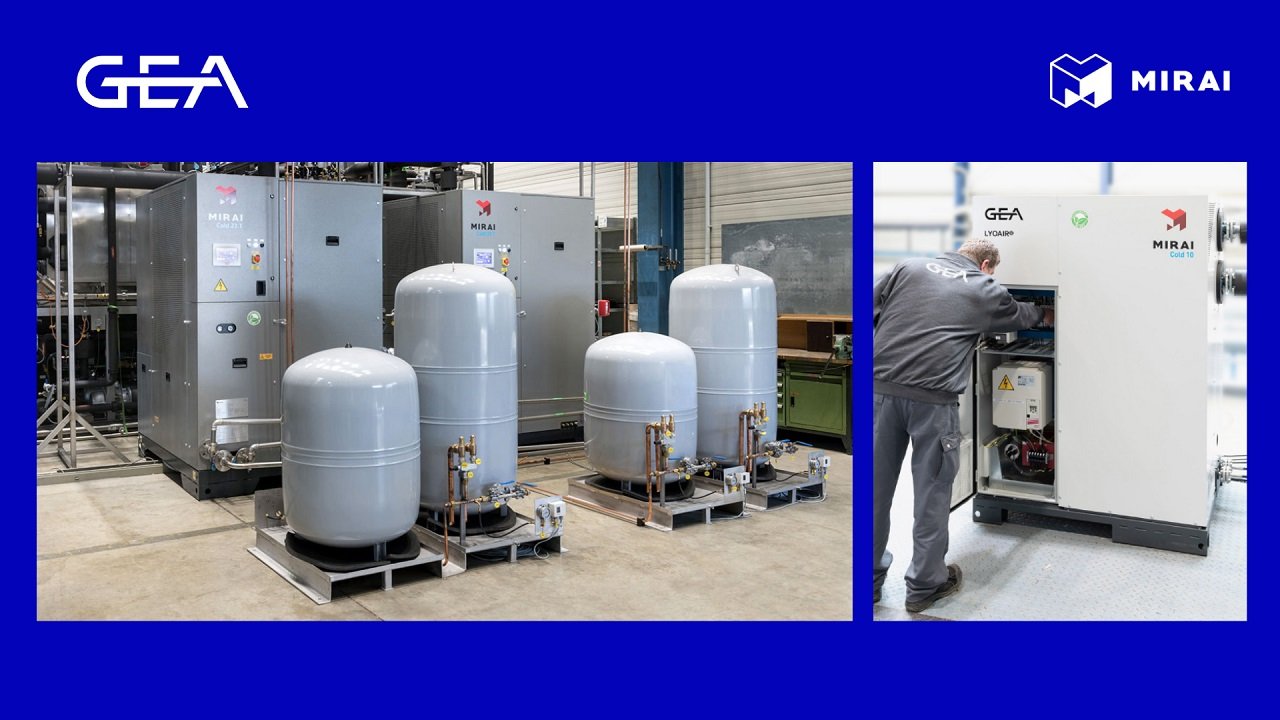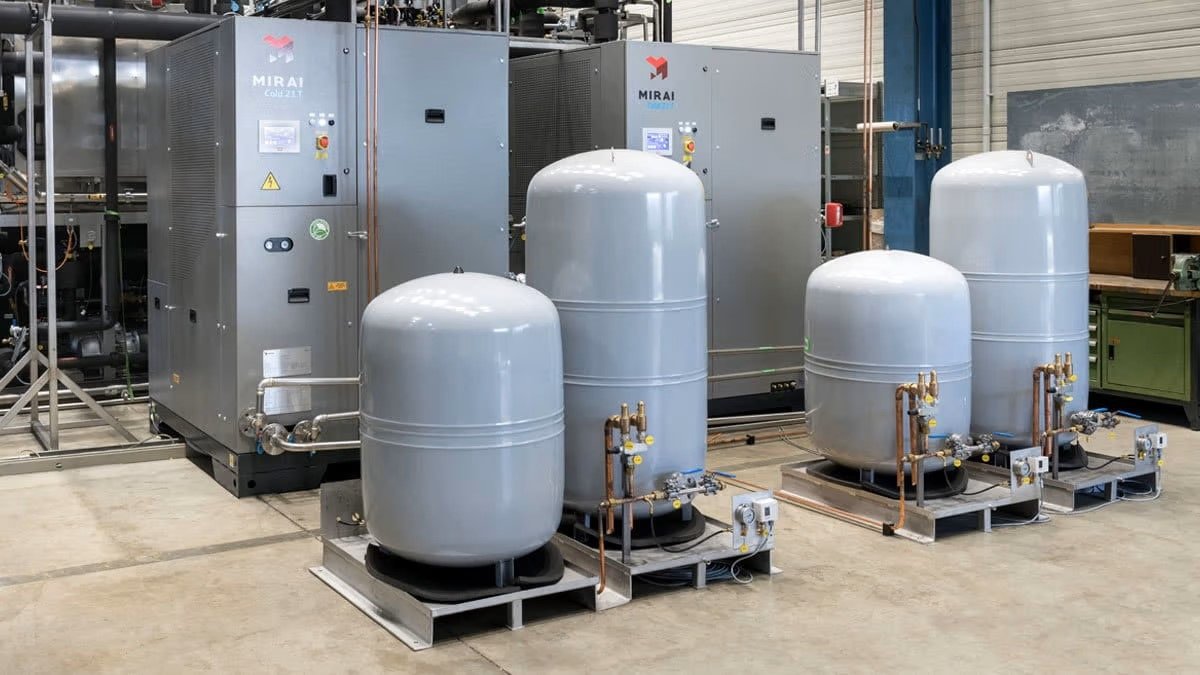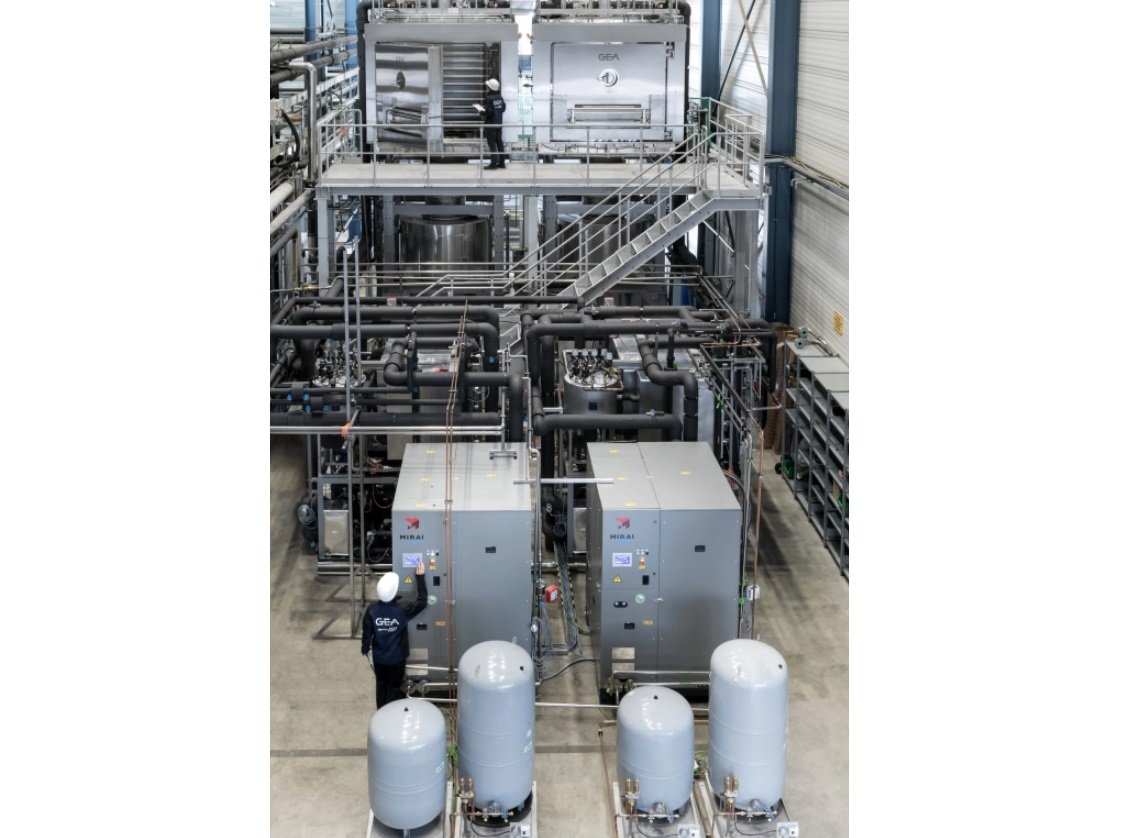bronze partner
12 April 2024
Sustainable Cooling for Freeze-Drying Applications with LYOAIR and MIRAI air cycle technology
GEA has been looking into alternative low-temperature cooling solutions that use natural refrigerants in commercial-scale freeze drying applications. As a result, the company has developed an innovative system using a combination of air cycling (Brayton or Coleman cycle) and carbon dioxide (CO2)-based cooling.
The LYOAIR system, which has been shown to demonstrate high levels of throughput and reliability, can be operated without special ATEX requirements and/or installed in a non-ATEX equipped room.
The air cycle cooler provided by MIRAI Intex, for optimal energy utilization, is used to chill both the condenser and, indirectly, the lyophilizer shelves as well. The condenser operates as a cold oil resource during the freezing process.
The GEA CO2 booster can reach shelf temperatures down to -50 °C and is suitable for a wide range of product freezing applications.The cooling system uses natural refrigerants (air and CO2) and has a global warming potential (GWP) of 1 (equivalent to CO2). In combination with the corresponding air cycle cooler, the LYOAIR system can reach -60 °C on the shelves and down to -115 °C on the condenser coils.
Carbon dioxide has a GWP of 1, which is considered to be the baseline figure or standard for comparison. If, for example, 1 kg of the hydrofluorocarbon (HFC) blend refrigerant R507 is expelled into the atmosphere and evaporates (becomes gaseous), this is equivalent to 3985 kg of CO2 being released (Source: AR5: IPCC V, 2014).
Not only does the LYOAIR cooling system employ natural refrigerants that comply with current greenhouse gas regulations, it also benefits from the integration of highly efficient and economic third-party compressors. The combination of an air cycle system (by MIRAI Intex) with a CO2 booster offers a lower energy consumption system for freeze dryers compared with a regular air cycle system and provides the full range of temperatures required for effective operation.
Further benefits include the elimination of explosive or toxic natural gases, less vibration and quieter functionality. It’s also easy to maintain and significantly less expensive to run than liquid nitrogen alternatives. Tests have already shown that the system can run for 90,000 hours (approximately 10 years of continuous operation) without the need for a major overhaul. Furthermore, the LYOAIR system is retrofit-compatible with all GEA Lyophil freezer dryers.
From a business perspective, it’s been estimated that the annual operational costs of using liquid nitrogen is 10 times higher than using the newly developed LYOAIR system. As such, in terms of return on investment, the energy savings would result in a capital expenditure neutral situation in less than 5 years (not including service charges). Not only that, there’s the added benefit of not polluting the atmosphere and environment withfluorinatedgases, which seep into the local ground water and can be extremely difficult to remove. For large-scale freeze dryers, GEA has calculated that up to 1000 tons of CO2 equivalent can be saved per machine.
The LYOAIR system, which has been shown to demonstrate high levels of throughput and reliability, can be operated without special ATEX requirements and/or installed in a non-ATEX equipped room.
The air cycle cooler provided by MIRAI Intex, for optimal energy utilization, is used to chill both the condenser and, indirectly, the lyophilizer shelves as well. The condenser operates as a cold oil resource during the freezing process.
The GEA CO2 booster can reach shelf temperatures down to -50 °C and is suitable for a wide range of product freezing applications.The cooling system uses natural refrigerants (air and CO2) and has a global warming potential (GWP) of 1 (equivalent to CO2). In combination with the corresponding air cycle cooler, the LYOAIR system can reach -60 °C on the shelves and down to -115 °C on the condenser coils.
Carbon dioxide has a GWP of 1, which is considered to be the baseline figure or standard for comparison. If, for example, 1 kg of the hydrofluorocarbon (HFC) blend refrigerant R507 is expelled into the atmosphere and evaporates (becomes gaseous), this is equivalent to 3985 kg of CO2 being released (Source: AR5: IPCC V, 2014).
Not only does the LYOAIR cooling system employ natural refrigerants that comply with current greenhouse gas regulations, it also benefits from the integration of highly efficient and economic third-party compressors. The combination of an air cycle system (by MIRAI Intex) with a CO2 booster offers a lower energy consumption system for freeze dryers compared with a regular air cycle system and provides the full range of temperatures required for effective operation.
Further benefits include the elimination of explosive or toxic natural gases, less vibration and quieter functionality. It’s also easy to maintain and significantly less expensive to run than liquid nitrogen alternatives. Tests have already shown that the system can run for 90,000 hours (approximately 10 years of continuous operation) without the need for a major overhaul. Furthermore, the LYOAIR system is retrofit-compatible with all GEA Lyophil freezer dryers.
From a business perspective, it’s been estimated that the annual operational costs of using liquid nitrogen is 10 times higher than using the newly developed LYOAIR system. As such, in terms of return on investment, the energy savings would result in a capital expenditure neutral situation in less than 5 years (not including service charges). Not only that, there’s the added benefit of not polluting the atmosphere and environment withfluorinatedgases, which seep into the local ground water and can be extremely difficult to remove. For large-scale freeze dryers, GEA has calculated that up to 1000 tons of CO2 equivalent can be saved per machine.
Key benefits of the air cycle system include:
- Technology based on the reverse Brayton or Bell Coleman cycle, with no chemical refrigerants
- Efficient at temperatures lower than -65 °C
- Very low temperatures achievable: down to -115 °C
- Quiet operation
- Smart redundancy because of multiple circuits
- 90,000 hours (10 years) of maintenance-free functionality for the air-cooling system
Related news
Güntner outlines 2026 strategy focused on efficiency, digitalisatio...
With the global HVAC-R market projected to exceed USD 210 billion in 2026, Güntner has presented its annual outlook, highlighting key growth drivers and its strategic response to industry demands. ...
17 Feb 2026
LU-VE Nordics secures €7.45M data center cooling contract in Sweden
LU-VE Group has announced a new contract in the data center segment through its LU-VE Nordics cluster, reinforcing its presence in Northern Europe’s data center cooling market. The order, valued at...
08 Jan 2026
Hitachi Energy to expand cooling systems factory in Sweden
Hitachi Energy is investing approximately $77 million in an expansion of its cooling systems factory in Landskrona, Sweden, citing increasing global demand for its cooling systems. The company ...
05 Jan 2026
IOR honours award winners and launches Industry Skills Alliance
The Institute of Refrigeration (IOR) presented five awards, launched its Industry Skills Alliance, and announced two new Fellows at its 126th Annual Dinner in London on 12 February 2026. The di...
16 Feb 2026
Trane Technologies Reports Growth in Commercial HVAC Bookings and B...
Trane Technologies reported a strong performance in its commercial HVAC segment for the fourth quarter and full year 2025, driven by high bookings and record backlog levels. The company saw continu...
09 Feb 2026
Frigoveneta acquires SAIM
Ambienta SGR announced that its platform company Frigoveneta S.p.A. has completed the acquisition of SAIM Impianti S.r.l. and SAIM Service S.r.l. (“SAIM”), a company specializing in the design, ins...
13 Feb 2026


